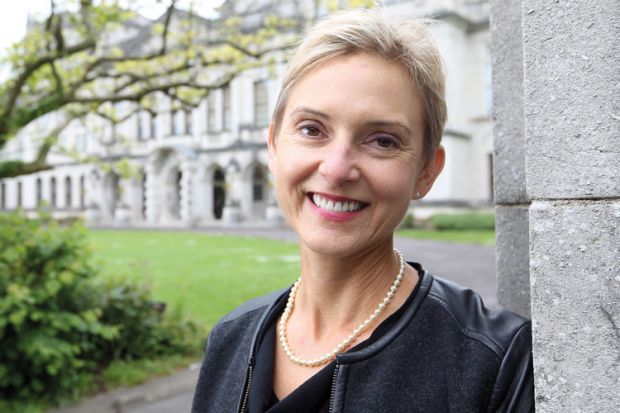Diana Huffaker is professor of electrical engineering and director of the Integrated NanoMaterials Core Lab at the University of California, Los Angeles. In May she was appointed chair in advanced engineering and materials at Cardiff University through the Welsh Assembly’s £50m Sêr Cymru programme. She starts in January 2016.
Where and when were you born?
St Louis, Missouri, 31 July 1964.
How has this shaped you?
All my grandparents are from very diverse backgrounds: farmer marries small business owner; academician marries Methodist minister. All these people mixed together in one family, so I had a diverse background.
You swapped the West Coast of the US for South Wales – quite a departure!
I love California – I’ve been so happy in UCLA and Los Angeles – but all the energy and excitement around the growth of Cardiff and especially the university [is appealing]. I have huge respect for the leadership of the Welsh government and the university itself. They’re putting their money and energy into the long-term betterment of their community and society by investing in academics and basic science. That’s a complete departure from the majority of governments, especially my own, where everything is much more short-sighted. I’m excited to be part of it.
Developing technology that is used in everyday items (eg, smartphones) is a clear example of research with “impact”. Are you constantly thinking about this concept when proposing projects, or is it a happy by-product of your research?
It’s a combination, it has to be. That’s a basic question of why we do research right now: should science be conducted because it has greater impact that can be seen in a two- or five-year period, or is it for the betterment of our knowledge base? I think it has to be a happy medium: researchers need to be given some leeway or else the ideas that might lead to something amazing 15 or 20 years from now can’t be realised. For example, the nanoscale was first discussed decades ago. If people weren’t allowed to think those thoughts, [we wouldn’t have been able] to realise what we do now. But also it’s exciting for researchers to see the science they’ve done come to fruition and make an impact on our everyday world.
You are the fourth Sêr Cymru research chair. Have you met the others and will you collaborate with them?
I have met Yves-Alain Barde [Sêr Cymru research chair in neurobiology at Cardiff]. When I first came through to the programme and heard of the amount of money and freedom that came with it, I had to ask him: is this for real? Are they really going to try and enable me the way they say they are? He said that everyone at Cardiff is brilliant and wants you to succeed. I think there will be collaboration in some fashion: interdisciplinary work is not only becoming more interesting but also required, because the problems we are trying to solve are hugely complex. One person can’t solve them and usually neither can one discipline.
The lack of women in senior academic positions is an issue in UK higher education, particularly in STEM subjects. What needs to be done to address this?
It needs to happen from the ground up. It’s not always appreciated as a socially minded, societally important field to take up. I see part of my job to be out in the community showing both girls and boys what an exciting profession this can be.
What has changed most in global higher education in the past five to 10 years?
Funding, probably. In the US a lot of HE is becoming more expensive and privatised. Conducting basic science is becoming more and more difficult to do.
If you were a prospective university student facing £9,000 fees, would you go again or get a job?
I would go again. There’s been a lot of press in the US with people saying university is just not worth it, but I always think it is. It opens up your world to thoughts that you haven’t experienced before. How do you put a price on that?
What kind of undergraduate were you?
I was not an incredible student. In fact, I always tell people I’m not that smart, I just worked really, really hard.
What keeps you awake at night?
I’m a pretty good sleeper, but my mind turns on early in the morning – anywhere between 3am and 5am, depending on what problems are rolling around in my head. These days I do more management than science – networking, running a research group – so often the things that keep me up have more to do with conducting research than how to solve a particular problem.
What advice would you give to your younger self?
Don’t underestimate what you can do and what the world has to offer. Again, coming from a small town, I had very little exposure to what was possible, yet I’ve always looked for the most fun thing around the corner.
POSTSCRIPT:
Print headline: HE & me
Register to continue
Why register?
- Registration is free and only takes a moment
- Once registered, you can read 3 articles a month
- Sign up for our newsletter
Subscribe
Or subscribe for unlimited access to:
- Unlimited access to news, views, insights & reviews
- Digital editions
- Digital access to THE’s university and college rankings analysis
Already registered or a current subscriber?







